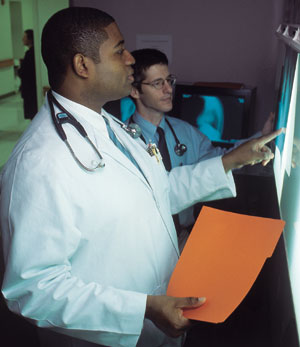

A publication of The Graduate School, University of North Carolina at Chapel Hill
Archives Fall 2002
Home | Back issues | About us | The Graduate School | UNC-Chapel Hill | Make a gift
 |
| Photo by Will Owens |
|
Kevin Lee, left, consults at UNC Hospitals with Dr. Christopher Klipstein from internal medicine. |
The Caring Connection
Kevin Lee combines engineering,
medicine and public health for compassionate health care
You
might call fourth-year medical student Kevin Lee a scientist’s Renaissance
man. With degrees in chemical engineering, public health and, soon, medicine,
Lee is a dedicated scientist equally at home discussing thermodynamics,
infectious diseases or kidney function.
But he loves the arts, too
— especially African-American fiction, cartoons and music. He even
plays the saxophone.
As his varied academic training
and broad interests attest, Lee, a former Weiss Fellow, is not your average
medical student. Relatively few medical students are engineers by training,
after all. And how many students would take a year away from medical school
to explore public health studies, adding an extra year to graduate school?
Lee’s journey from engineer
to health care professional was driven by a simple desire — to work
with and help people.
Growing up in rural Sampson
County, N.C., Lee wanted to be an engineer. “I was always interested
in the way things work,” Lee said. “But what I found missing
from engineering was the intimate interaction with people.”
While still studying chemical
engineering at Massachusetts Institute of Technology in Cambridge, Lee
decided that he wanted to become a surgeon — one who works to develop
relationships with his patients. Lee plans on specializing in urology,
which will allow him to counsel people on a primary-care level.
“As a urologist, you get
a chance to develop long-term relationships with patients,” Lee said.
“It’s relatively unique as compared to other surgical disciplines.”
Urology also appeals to the
inner engineer still very much alive in Lee. “Urologists are experts
on water flow, from kidneys to urethra,” Lee said. “The hands-on
part of me is still interested in the way things work. Engineers are trained
to solve complex technical problems. I think my background makes me better
able to look at information, synthesize it and solve a problem.”
Urology also overlaps with
his primary public health interest, maternal and child health, which he
studied at the UNC-Chapel Hill School of Public Health during the 2001-2002
school year. “Urology generally
tends to be about men’s health, but it plays a big role for kids
and women as well,” Lee said. “Both can have urinary tract troubles
that require the attention of a urologic surgeon.”
Lee’s interest in urology
and children’s health sparked an interest in spina bifida, a neurological
disorder associated with bladder dysfunction. The disorder, which occurs
when a child’s spine does not close properly during pregnancy, sometimes
leads to paralysis. He started working on a study in spring 2002 with
a doctor at UNC-Chapel Hill’s medical school to try to understand
the link between spina bifida and bladder problems associated with it.
In addition to spina bifida
and maternal and child health, Lee is also concerned about health care
disparities in the United States. “In this country, white people
tend to be the most healthy. We have a decent understanding about why
these disparities exist, but we don’t talk enough about how to fix
them.”
Lee’s varied interests
make him a good match for the Weiss Urban Livability Fellowship, which
funded his year in the School of Public Health. “Health has a place
in discussions about urban living,” he said. “As doctors and
public health professionals, we worry about infectious diseases and environmental
influences, such as those that cause asthma.”
Just as he believes public
health can contribute to studies of urban living, Lee feels that he has
learned from the other Weiss fellows. “I enjoy hearing what everyone’s
take is on any aspect of urban living,” Lee said. “I think the
discussions we have give me a perspective I never would have gotten otherwise.”
The amount of time Lee has
spent training for his career may sound imposing: five years at MIT, five
years of graduate work at UNC, and at least five more years in the medical
residency that will come after graduation.
But for Lee, the choice to
dedicate so much time to school came easily. “In the grand scheme
of things, it’s nothing,” Lee said. “The things that you
learn and experience and understand make a difference to your career and
your personal life.”
While Lee looks forward to
finding out where his medical residency will take him after graduation
in June 2003, he doesn’t plan on settling permanently into a typical
medical career. “I’ll always be a physician, but not just a
physician. For example, my wife and I want to do missionary work some
day. And I think that what I’ve learned as an engineer and as a public
health professional will serve me well in the future.”
- Elizabeth Spainhour
© 2002, The Graduate School, The University of
North Carolina at Chapel Hill
All text and images are property of The Graduate School
at the University of North Carolina-Chapel Hill. Contact Sandra Hoeflich
at shoeflic@email.unc.edu
to request permission for reproduction.